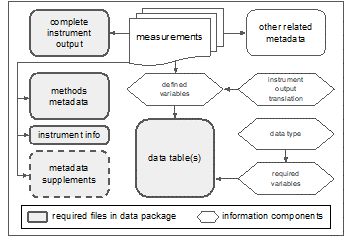The Science
Leaf-level gas exchange data inform the mechanistic understanding and model representation of plant fluxes of carbon and water in terrestrial biosphere models where parameters derived from gas exchange data also determine how plants will respond to global environmental change. The high value of leaf-level gas exchange data is exemplified by the many publications that reuse and synthesize gas exchange data. However the previous lack of metadata and data reporting conventions have made full and efficient use of these data difficult. We have proposed a reporting format for leaf-level gas exchange data and metadata to provide guidance to data contributors on how to store data in repositories to maximize their discoverability, facilitate their efficient reuse, and add value to individual datasets. The reporting format has been developed for use in ESS-DIVE, but has received strong support from the global plant physiology community.
The Impact
Collection leaf-level gas exchange data requires specialist training, is time consuming, can involve elaborate logistics, and often utilizes techniques adapted to particular experiments, instruments and environments. Thus, resulting data products are low volume, have diverse and heterogeneous content, and are thus not easily shared. Adoption of a common reporting format will make these data more FAIR, that is, Findable, Accessible, Interoperable and Reusable. These characteristics facilitate data synthesis, incorporation into models and scientific discovery. Development of this reporting format has garnered considerable interest beyond the ESS community, with contributions from 80 experts from around the world, including data collectors, modelers, data scientists, and instrument manufacturers.
Summary
The leaf-level gas exchange reporting format provides recommendations on how to prepare these data for sharing in data repositories. The format comprises defined variable names and definitions, and for a number of the most common measurement types, lists the minimum required data variables. A comprehensive metadata description template has been developed to allow unambiguous interpretation of data by future users. The format strongly encourages archive of the original complete instrument output to allow for novel future use of these valuable data.


Contacts (BER PM): Daniel Stover, SC-23.1, Daniel.Stover@science.doe.gov (301-903-0289)
PI Contact: Alistair Rogers, Brookhaven National Laboratory, arogers@bnl.gov
Deb Agarwal, Lawrence Berkeley National Laboratory, daagarwal@lbl.gov
Funding
DOE Office of Science BER, Environmental Systems Science Data Infrastructure for a Virtual Ecosystem (ESS-DIVE) community funds. Further support was received from several additional projects funded by the Office of Biological and Environmental Research, including the Next Generation Ecosystem Experiments -Arctic (NGEE-Arctic) and -Tropics (NGEE-Tropics) projects.
Publications
Ely, Kim S., Alistair Rogers, Deborah A. Agarwal, Elizabeth A. Ainsworth, Loren P. Albert, Ashehad Ali, Jeremiah Anderson, et al. (2021). A Reporting Format for Leaf-Level Gas Exchange Data and Metadata. Ecological Informatics 61: 101232. doi: 10.1016/j.ecoinf.2021.101232
Ely, Kim S., Alistair Rogers, Robert Crystal-Ornelas (2020). ESS-DIVE reporting format for leaf-level gas exchange data and metadata. Environmental Systems Science Data Infrastructure for a Virtual Ecosystem. doi:10.15485/1659484
Related Links
https://www.sciencedirect.com/science/article/pii/S1574954121000236?via%3Dihub
https://data.ess-dive.lbl.gov/view/doi:10.15485/1659484
https://github.com/ess-dive-community/essdive-leaf-gas-exchange
https://ess-dive.gitbook.io/leaf-level-gas-exchange/